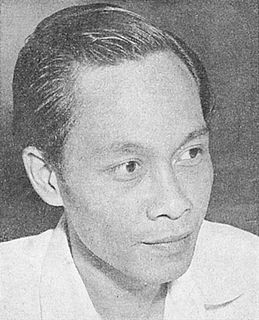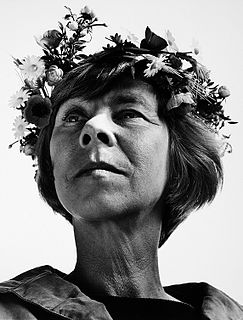A Quote by Joanna Russ
I once asked a young dissertation writer whether her suddenly grayed hair was due to ill health or personal tragedy; she answered: “It was the footnotes”.
Related Quotes
She remembered that once, when she was a little girl, she had seen a pretty young woman with golden hair down to her knees in a long flowered dress, and had said to her, without thinking, "Are you a princess?" The girl had laughed very kindly at her and asked her what her name was. Blanche remembered going away from her, led by her mother's hand, thinking to herself that the girl really was a princess, but in disguise. And she had resolved that someday, she would dress as though she were a princess in disguise.
The WRITER of memoir gets incoming weirdness in very odd ways. I was recently talking to a memoir writer whose work just went meteoric - but some of the comments and communications and gestures she gets in the wake of that success are stunningly and atrociously over-personal, as if suddenly people feel like they know her and her life intimately, and have permission to transgress all her "life" boundaries.
Papa, do you like my new friend?" Frances Catherine asked when they were halfway across the field. "I surely do." "Can I keep her?" "For the love of...No, you can't keep her. She isn't a puppy. You can be her friend, though," he hastily added before his daughter could argue with him. "Forever, papa?" She 'd asked her father that question, but Judith answered her. "Forever," she shyly whispered. Frances Catherine reached across her father's chest to take hold of Judith's hand. "Forever," she pledged.
She had asked: What is he? A friend or an enemy? The alethiometer answered: He is a murderer. When she saw the answer, she relaxed at once. He could find food, and show her how to reach Oxford, and those were powers that were useful, but he might still have been untrustworthy or cowardly. A murderer was a worthy companion. She felt as safe with him as she'd done with Iorek Byrnison the armoured bear.
Such was the love of this grandson for his grandmother that two years after the death of his mother, when she herself fell gravely ill, he vowed to her that someday he would try to tell the world her life story. 'But why?' she asked humbly. 'I'm no one, just a girl from the coast' 'But you are everyone, Grandma,' the young Pramoedya told her. 'You are all the people who have ever had to fight to make this life their own.
I sit on the couch watching her arrange her long red hair before my bedroom mirror. she pulls her hair up and piles it on top of her head- she lets her eyes look at my eyes- then she drops her hair and lets it fall down in front of her face. we go to bed and I hold her speechlessly from the back my arm around her neck I touch her wrists and hands feel up to her elbows no further.
I'm looking for a writer who doesn't know where the sentence is leading her; a writer who starts with her obsessions and whose heart is bursting with love, a writer sly enough to give the slip to her secret police, the ones who know her so well, the ones with the power to accuse and condemn in the blink of an eye. It's all right that she doesn't know what she's thinking until she writes it, as if the words already exist somewhere and draw her to them. She may not know how she got there, but she knows when she's arrived.
Hello, Harry!” she said. “Er — my name’s Barny,” said Harry, flummoxed. “Oh, have you changed that too?” she asked brightly. “How did you know — ?” “Oh, just your expression,” she said. Like her father, Luna was wearing bright yellow robes, which she had accessorized with a large sunflower in her hair. Once you got over the brightness of it all, the general effect was quite pleasant. At least there were no radishes dangling from her ears.
I think that we should take the tragedy that happened in Newtown and have a full comprehensive dialogue about all issues, whether it has to do with mental health, whether it has to do with the social decline of our young people and some of the things that they are exposed to, whether it has to do with the firearms and guns.
Because of course she had known she must go. She always did the thing because in obedience lay the integrity that God asked of her. If anyone had asked her what she meant by integrity she would not have been able to tell them but she had seen it once like a picture in her mind, a root going down into the earth and drinking deeply there. No one was really alive without that root.
Alex gazed at her. Her mouth was slightly open; she ran her fingernail against her lower teeth as she thought. She'd knotted her hair at the nape of her neck again, and a strand had slipped loose onto her shoulder, gleaming in the lantern light. Suddenly all of his objections seemed meaningless. Don't, he thought. You'll regret it. He didn't care anymore. Slowly, unable to stop himself, he reached out and cupped his hand around her foot.
You say that if we hadn't just gotten married, you would want to marry Miss Arkansas. Even if she can't spell. She can sit on her hair. A lover could climb that hair like a gym rope. It's fairy-tale hair, Rapunzel hair. We saw her practicing for the pageant in the hotel ballroom with two wild pigs, her hair braided into two lassoes.
She had been sharing a house with him for a week, and he had not once flirted with her. He had worked with her, asked her opinion, slapped her on the knuckles figuratively speaking when she was on the wrong track, and acknowledged that she was right when she corrected him. Dammit, he had treated her like a human being.






































